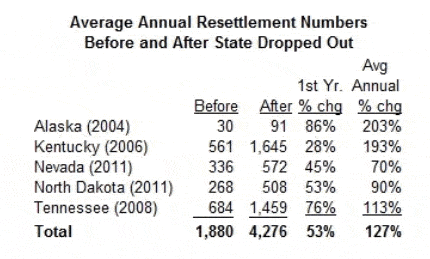Judge to Tennessee: You’ll Take Refugees Whether You Want to or Not
James Simpson, The Federalist, April 2, 2018
Last March, the Thomas More Law Center (TMLC) initiated a lawsuit against the federal government on behalf of the Tennessee legislature, charging the refugee resettlement program imposes unconstitutional unfunded mandates, requiring states to pay for resettlement whether they participate in the federal program or not. For a year, the sides engaged in legal maneuvers while the judge dawdled.
This March, despite multiple Supreme Court rulings that the federal government cannot compel states to pay for unfunded federal mandates, the judge dismissed the case. He claimed the state of Tennessee, while fully responsible for financing the state’s share of resettlement program costs, did not have standing to bring the suit.
Many aspects of the refugee resettlement program force states and local governments to continue to accept refugees even if they choose not to participate in the program, and pay for a laundry list of services to those refugees once resettled. The lawsuit focused specifically on the requirement for the state to pay exorbitant Medicaid costs or risk losing up to $7 billion in federal Medicaid reimbursements, an amount equal to 20 percent of the entire state budget.
In his 43-page decision, the judge ruled that, according to Tennessee law, only the Tennessee attorney general had the authority to sue, but would not have standing anyway because the state had not first attempted to gain relief through an administrative appeal directly to the federal government. (Tennessee’s attorney general and governor had declined to back the suit.) Thus the state would be put in the impossible position of having to first lose some or all of that $7 billion before it could sue.
The case demonstrates how convoluted the refugee resettlement program is, and despite the enormous burdens it places on state and local taxpayers, has remained resistant to successful challenge.
{snip}
Refugee Resettlement Affects Communities
The panel focused on the lawsuit and an excellent analysis of the issue published in January by Don Barnett. Barnett noted, “When the Obama administration raised the refugee admission quota for fiscal year 2017 to 110,000 – a really great raise over his average. His average is probably about 75,000 a year. So it was raised to 110,000 on the way out. New Jersey, Maine, Kansas, and Texas formally withdrew from the program. Actually, however, this is a program that states can never leave.”
{snip}
Don’t Want to Run a Refugee Program? Tough
The 1980 Refugee Act created the U.S. Refugee Assistance Program, which uses private, tax-exempt organizations called “voluntary agencies” or “VOLAGs,” and a network of subsidiaries, called “affiliates,” to resettle refugees within the United States. These organizations are paid by the head to resettle refugees. The act requires consultation with state and local governments before refugees can be resettled, and allows states to opt out of the program altogether.
The act also promised to cover the state portion of federal welfare program costs for refugees for three years. This was an important factor in passing the act because refugees use welfare at rates much higher that of U.S. citizens or even other immigrant groups.
{snip}
When States Aren’t In Charge, the Numbers Spike
VOLAGs receive anywhere from $3,000 to $5,000 for each refugee they resettle, so they seek to maximize refugee numbers, and find it much easier to place more in states with no oversight. The numbers make the case.
Between fiscal year 2002 (the earliest state-by-state data available) and fiscal year 2017, Alabama, Alaska, Kansas, Kentucky, Maine, Nevada, New Jersey, North Dakota, Tennessee, and Texas dropped out. Of these, five have been run by VOLAGs long enough to compare resettlement data before the state left the program and after. The table below shows the results.
Note that even in just the first year, refugee resettlement in those states shot up an average of more than 50 percent. In total, these states have seen an average annual increase of 127 percent since they relinquished program oversight.
 Source: Refugee Processing Center; Interactive Reporting; www.wrapsnet.org.
Source: Refugee Processing Center; Interactive Reporting; www.wrapsnet.org.
As a result of all these factors, the refugee resettlement program has evolved into a largely unfunded mandate on states, and especially in Wilson-Fish states. The TMLC complaint specifically charged:
{snip}















